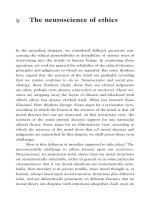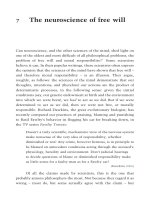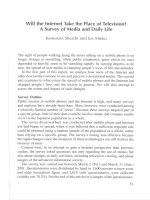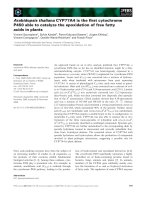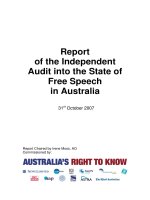The neuroscience of free will
Bạn đang xem bản rút gọn của tài liệu. Xem và tải ngay bản đầy đủ của tài liệu tại đây (201.05 KB, 36 trang )
7 The neuroscience of free will
Can neuroscience, and the other sciences of the mind, shed light on
one of the oldest and most difficult of all philosophical problems, the
problem of free will and moral responsibility?
1
Some scientists
believe it can. In their popular writings, these scientists often express
the opinion that the sciences of the mind have shown that free will –
and therefore moral responsibility – is an illusion. They argue,
roughly, as follows: the sciences of the mind demonstrate that our
thoughts, intentions, and (therefore) our actions are the product of
deterministic processes, in the following sense: given the initial
conditions (say, our genetic endowment at birth and the environment
into which we were born), we had to act as we did. But if we were
determined to act as we did, then we were not free, or morally
responsible. Richard Dawkins, the great evolutionary biologist, has
recently compared our practices of praising, blaming and punishing
to Basil Fawlty’s behavior in flogging his car for breaking down, in
the TV series Fawlty Towers:
Doesn’t a truly scientific, mechanistic view of the nervous system
make nonsense of the very idea of responsibility, whether
diminished or not? Any crime, however heinous, is in principle to
be blamed on antecedent conditions acting through the accused’s
physiology, heredity and environment. Don’t judicial hearings
to decide questions of blame or diminished responsibility make
as little sense for a faulty man as for a Fawlty car?
(Dawkins 2006)
Of all the claims made by scientists, this is the one that
probably annoys philosophers the most. Not because they regard it as
wrong – most do, but some actually agree with the claim – but
because it is made in apparent ignorance of literally thousands of
years of debate on the question whether free will is compatible with
causal determinism. There are powerful arguments for the claim that
it is incompatible, but also powerful arguments on the other side.
Most philosophers today are compatibilists; that is, they
believe that free will is compatible with determinism. The case for
compatibilism has several strands. First, compatibilists argue that
the view that free will is incompatible with determinism rests upon a
confusion of causation with coercion or control. I am unfree, cer-
tainly, if my actions are controlled by another agent: if, for instance,
my desires and beliefs are simply irrelevant to what I end up doing. If
someone physically manipulates me, or holds a gun to my head, then
my actions have their source in someone else, and I am not respon-
sible for them. But the mere fact that determinism is true (if it is true)
doesn’t show that our actions are coerced or controlled by others.
When I go get myself a cheese sandwich, I do so because I want to,
and this remains true even if I am determined to want a cheese
sandwich. No one forces me to get a cheese sandwich. Not even
determinism forces me: to be determined to do something is nothing
like being forced to do it. Once again, force is something that is
applied to me in spite of what I want, by others or the external world,
but determinism, if it is true, works through me and my desires. We
rightly resent force, external control and coercion, but we are just
confused if we assimilate determinism to these external powers.
Even if determinism is true, rational agents are typically free: free to
do what they like.
Second, compatibilists point out that if it is difficult, at least
for some people, to see how free will could be compatible with
determinism, it is apparently rather more mysterious how it could be
compatible with indeterminism. Some scientists and laypeople who
hope to rescue free will do so by appeal to quantum mechanics.
Quantum mechanics is the science of subatomic particles, and is the
foundation of modern physics. It is the most fundamental theory we
possess for describing the physical world. Popular misconceptions to
the neuroscience of free will
223
the contrary, the theory is well understood and well confirmed.
However, it is highly controversial just what the world described by
quantum mechanics is like, in the most basic sense. Quantum
mechanics uses probabilistic rather than deterministic equations to
describe the behavior of sub-atomic particles. On the so-called
Copenhagen interpretation of quantum mechanics, these equations
capture the nature of physical reality: the equations are probabilistic
because the world is fundamentally indeterministic. This inter-
pretation is the dominant one; rival interpretations attempt to save
determinism by postulating hidden variables or limits on observa-
tion. It is therefore controversial whether the universe is entirely
deterministic. However, it is far from obvious that contemporary
physics can come to the aid of the incompatibilist who wants to
preserve free will.
First, even if the universe is indeterministic at a sub-atomic
level, it may be that these indeterminacies get washed out at the
macroscopic level. The behavior of everything we can observe with
the naked eye, or even with ordinary microscopes, seems determi-
nistic and predictable: sub-atomic indeterminacy may simply be
washed out. In that case, sub-atomic indeterminacy can be ignored:
the world is deterministic for almost all practical purposes. Suppose,
second, that that’s not the case; that sub-atomic indeterminacy can
affect the behavior of complex macroscopic objects such as human
beings. How will that help? If I am not free, despite the fact that I can
do what I want when I want, how does the fact that sometimes – due
to a random event – I fail to do what I want when I want to enhance
my freedom? Just the opposite seems to be the case: indeterminacy
would reduce, not increase, my freedom, since I cannot control the
random behavior of sub-atomic particles.
2
Incompatibilists generally accept that it is a mistake to
assimilate determinism to coercion or external control. But they
have other reasons for thinking that determinism is incompatible
with free will. They point out that we can apparently fail to be
free even when we do what we want: for instance, when others
the neuroscience of free will
224
manipulate our wants (Kane 1996; Pereboom 2001). Determinism
might render us unfree in an analogous way. But, compatibilists
respond, there are salient differences between cases in which our
wants are manipulated and cases in which they are merely caused.
We are someone’s puppet in the first scenario, but not in the second.
Different varieties of incompatibilists part ways at this point,
depending upon their beliefs about the causal structure of the world.
Some incompatibilists are determinists, and therefore hold that there
is no free will in our world (Pereboom 2001). Some deny that deter-
minism is true; they therefore hold that some actions (at least) are
free. These incompatibilists are known as libertarians (Kane 1996;
Ekstrom 1999; O’Connor 2000).
Obviously, we cannot hope to settle the debate whether free
will is compatible with determinism, a debate that is perhaps the
most complex and difficult in all of philosophy, here. It should be
clear, however, that those scientists who think that the revelation
that the brain is deterministic is sufficient to show that free will
does not exist, without further argument, are mistaken: they do not
know whereof they speak. That is not, however, to say that the
sciences of the mind may not have a bearing on free will and moral
responsibility.
The rest of this chapter will consider two topics. First, I shall
examine a global challenge to our free will and moral responsibility.
Some neuroscientists have argued that we are not free, not because
our actions are determined, but because we do not consciously cause
our behavior. Having seen off this threat, I shall examine some of the
ways in which our growing knowledge about the mind will help us to
distinguish between individuals. Rather than neuroscience showing
that no one is ever responsible, I shall argue, attention to its dis-
coveries will help us to see who is responsible, and who is not.
consciousness and freedom
Some recent results in neuroscience and in psychology have been
seen, by some thinkers, to present us with a fresh challenge to
consciousness and freedom
225
freedom, independent of determinism. These results allegedly show
that we do not consciously cause our intentions, decisions or volit-
ions, and therefore our actions. If this is true, many believe, we do
not act freely. As Robert Kane, one of the leaders of the recent revival
of libertarianism puts it, ‘‘If conscious willing is illusory or epiphe-
nomenalism is true, all accounts of free will go down, compatibilist
and incompatibilist’’ (Kane 2005).
In what follows, I will outline the threat, in the two forms in
which it comes; I will also briefly sketch some of the ways in which
philosophers have responded to it. These responses are designed to
show that the experimental evidence does not, in fact, establish the
claim that we do not consciously cause our actions. I shall then
develop a response of my own. My response differs from the existing
replies inasmuch as rather than attempting to show that the
experiments are flawed, it shows that even if they successfully
establish that consciousness does not play a direct role in action-
causation, we can still be free and morally responsible agents. The
evidence I shall cite for this claim will itself be drawn from the
sciences of the mind.
who decides when i decide?
In essence, the claim made by both variants of the empirical chal-
lenge to moral responsibility is this: consciousness plays no direct
role in decision-making or volition. We do not consciously decide or
consciously initiate action. Consciousness comes on the scene too
late to play any causal role in action. Two thinkers have attempted,
independently, to demonstrate that this is the case: Benjamin Libet, a
neuroscientist, and Daniel Wegner, a psychologist.
Libet’s experiment is one of the most famous in recent neuro-
science: Libet and his colleagues asked subjects to flick or flex their
wrist whenever they wanted to, while the experimenters recorded
the ‘‘readiness potential’’ (RP) in their brains, which precedes
voluntary movement by up to one second or so (Libet et al. 1983).
Subjects were also asked to watch a special clock face, around which
the neuroscience of free will
226
a dot of light travelled about twenty-five times faster than a normal
clock (with each ‘‘second’’ therefore being about 40 milliseconds).
They were required to note the position of the dot on the clock face at
the time at which they became aware of the wish to move their wrist.
Controlling for timing errors, the experimenters found that onset of
RP preceded awareness of the wish by an average 400 milliseconds. In
other words, subjects became aware of their decision to act only after
its implementation was underway.
Libet’s experiment has widely been seen as an empirical
demonstration that there is no such thing as free will (Spence 1996;
Pockett 2004). Libet has shown, the argument goes, that conscious-
ness of the decision to act or of the volition comes too late to be
causally effective. Consciousness is informed of the decision; it does
not make it. But the agent, the target of ascriptions of praise and
blame, is, if not identical to consciousness, at least more properly
identified with consciousness than with the subpersonal mechan-
isms that are, as a matter of fact, causally effective in action. It turns
out that we do not make our decisions; they are made for us. But if
we cannot control what we decide to do, then we cannot be
responsible for our decisions (Zhu 2004).
3
Philosophers and cognitive scientists have not been slow to
find fault with Libet’s claims. For instance, Flanagan (1996a) argues
that it is consistent with Libet’s results that we consciously initiate
important or ‘‘big picture’’ decisions, merely leaving the details of the
implementation of these decisions to subpersonal processes. Thus,
having – consciously – decided to comply with Libet’s instructions to
flick their wrist when they felt like it, his subjects might have
delegated the details to the unconscious mechanisms which Libet’s
experiment tracks. If that’s right, then our big picture decision might
after all be made consciously. As Richard Double (2004) has recently
put it, this picture leaves plenty of space for a distal cause (compa-
tibilist) or distal influence (libertarian) view of moral responsibility.
Alfred Mele (2007) shows that it is reasonable to doubt whether
Libet is right in identifying the subjective reports with the intention
who decides when i decide?
227
or the decision to flick, rather than with an urge or a desire to flick.
Hence, Libet’s experiment might not bear upon the role of con-
sciousness in decision-making at all. Haggard (Haggard and Libet
2001) has argued that though Libet is right in thinking that we do not
consciously initiate actions, our conscious intention may coincide
with the specification of action. Our decision to act may not be
conscious, but the choice of how precisely to act (whether, for
instance, to use our left hand or our right) might nevertheless be
made consciously. Finally Dennett (1991; 2003) has shown that there
are deep problems with relying upon subjective judgments of
simultaneity, as a consequence of which we cannot rely upon Libet’s
results. In any case, Dennett argues, it is a mistake to think that
there is a precise moment at which anything enters consciousness:
the idea that there is any such moment is a hangover from the notion
of the Cartesian Theatre, where everything comes together and is
viewed by the self. Such a notion, Dennett points out, has rightly
been discarded by philosophers and neuroscientists, since its truth
requires that the self be an extensionless point – in other words, a
Cartesian immaterial ego. Yet we all too easily fall back into modes
of thought that commit us to it. Once we reject the notion of the
Cartesian theatre finally and decisively, we shall recognize that
consciousness is temporally smeared; not a moment, but a process
with fuzzy edges.
Libet’s is not the only threat to the role of consciousness in
action, however. Before we assess his challenge and these responses
to it, let’s set out Wegner’s version of the threat.
In his book The Illusion of Conscious Will, Wegner (2002)
presents a wealth of evidence for essentially the same conclusion
advanced by Libet: that consciousness does not initiate action.
Wegner distinguishes between what he calls the phenomenal will –
our experience of our will as causally effective – and the empirical
will; the actual causal mechanisms of behavior. The eponymous
‘‘illusion of conscious will’’ arises when we mistake the first for the
second; when we take our experience of causation to be a direct
the neuroscience of free will
228
readout of the reality. In fact, our experience is a belated and unre-
liable record of action; it is neither itself a causal force, nor is it a
direct reflection of the actual causal forces.
Wegner argues that, far from being the cause of our actions,
the phenomenal will is itself caused by the mechanisms that
actually produce actions. The real causal springs of our actions
are subpersonal – and therefore unconscious – mechanisms. These
mechanisms produce the action, but they also produce a mental
preview of the action. So long as certain conditions are satisfied,
agents take this mental preview to be the real cause of the action. As
Wegner (2002: 64) puts it, ‘‘People experience conscious will when
they interpret their own thought as the cause of their action.’’ We
fall victim to this illusion when three conditions are satisfied: the
mental preview of action occurs at the right time (prior to the action,
but close to the moment of its initiation), the preview is consistent
with the action and the agent is unaware of other potential causes of
the action. Wegner calls these three conditions of the experience of
conscious will the priority, consistency and exclusivity principles.
Since his account explains why we think that our preview of
the action causes it, Wegner calls it the theory of apparent mental
causation.
In defence of his claim that conscious will is an illusion,
Wegner offers us evidence that conscious will is subject to a double
dissociation: its presence is not an infallible guide to our agency, and
its absence is not an infallible guide to our passivity. Consider the
second claim first. In a number of situations, both inside and outside
the laboratory, people sincerely deny that they have acted, when in
fact they have. Some kinds of paranormal experiences are good
illustrations of this phenomenon. For instance, the phenomenon of
table turning, which amazed so many Victorians, can be parsimo-
niously explained via Wegner’s theory. In table turning, a group of
people sit around a table, each with his or her hands flat on its sur-
face. If they believe or hope that it will begin to turn on its own, it
often, miraculously, will. The phenomenon was often interpreted as
who decides when i decide?
229
evidence for the existence of supernatural beings. Of course, the
participants were themselves making the table turn; the real mystery
is why they sincerely denied their own agency. Wegner suggests that
when many agents each contribute to the causation of an action – in
other words, when the exclusivity principle is not satisfied – we may
easily overlook our own contribution. The movements of the pointer
on the Ouija board can be explained in precisely the same way. So,
sadly, can the phenomenon of facilitated communication, in which
facilitators take themselves to be merely helping profoundly disabled
people to communicate, but in which the ‘‘facilitator’’ is themselves
the source of the message (2002: 195–201). It seems that absence of
the feeling of will is not proof of absence of agency.
Whereas evidence for the second dissociation can be collected
‘‘in the wild,’’ Wegner needed to design experiments to demonstrate
the possibility of the first. Most convincing here is the ‘‘I-Spy’’
experiment (Wegner 2002; Wegner and Wheatley 1999). Briefly, the
experiment placed subjects in a situation in which the degree of their
causal contribution to an action was unclear, due to the presence of
an experimental confederate. Wegner and Wheatley found that when
the confederate caused an action in this situation, the subject would
over-attribute it to themselves if they were primed in accordance
with the priority principle. The feeling of conscious will can be
produced by priority and consistency in the absence of exclusivity,
and in the absence of genuine agency.
Philosophers have responded to Wegner’s claims in ways that
are closely analogous to the manner in which they have responded to
Libet: they have denied that Wegner has shown that consciousness
does not play a direct role in action. They have pointed out that the
demonstration of a double dissociation does not show anything about
the normal case. Consider perception: sometimes people fail to see
an object in front of them – because of a more or less spectacular
dysfunction in their visual system, or because it is disguised – and
sometimes they claim to see what is not there (as in many visual
illusions). Perception, too, is subject to a double dissociation. But it
the neuroscience of free will
230
does not follow that our impression that our percepts are caused by
objects in the world is generally false (Nahmias 2002; Metzinger
2004; Bayne 2006).
How strong are these responses to Libet and to Wegner? I shall
not attempt to evaluate them in any detail. For what it’s worth,
I suspect they are (at minimum) successful in pointing out severe
problems in their arguments and experimental designs. Neither has
demonstrated, anywhere near conclusively, that consciousness does
not initiate action or make decisions. However, though these phi-
losophers have won this battle, I suspect they will lose the war:
consciousness does not, in fact, play the kind of role in action that
Libet and Wegner believe to be required in order for us to be morally
responsible. We should therefore get on with assessing whether, and
how, moral responsibility might be compatible with the finding that
consciousness does not initiate actions or make decisions.
consciousness and moral responsibility
Prima facie, consciousness seems required for moral responsibility.
Indeed, the claim that agents must be conscious of their actions
(decisions) seems to be built into our legal system, and to drive our
intuitions about praise and blame. Consider the legal doctrine of
mens rea. Someone is guilty of a crime (strict liability aside, which is
in any case rare in the criminal law) only if they were in the requisite
state of mind, where ‘‘being in a state of mind’’ seems to require
consciousness. In order to be liable for the highest degree of criminal
responsibility, an agent must have performed a wrongful action
purposefully and knowingly. A somewhat lower degree of moral
responsibility can be imputed if the agent acted recklessly, which
might be understood as having been conscious of the risks of one’s
conduct, but nevertheless having failed to take due care. These
grades of moral responsibility seem to require consciousness: of
intentions, of risks and possible consequences. To be sure, negligence
does not seem to require consciousness, but it is the lowest grade of
responsibility. For all grades above negligence, consciousness seems
consciousness and moral responsibility
231
required for responsibility. And, precisely because negligence can be
imputed in the absence of consciousness, some philosophers regard
negligence as a legal fiction.
The notion that consciousness is required for moral responsi-
bility seems therefore to be central to the criminal law. It also seems
to be at work in explaining our assessments of responsibility in
exotic cases, such as cases of automatism. Recall (from the intro-
duction) the case of Ken Parks. In 1987, Parks drove the twenty-three
kilometres to the Ontario home of his parents-in-law, where he
stabbed them both. He then drove to the police station, where he told
police that he thought he had killed someone. Only then, apparently,
did he notice that his hands had been badly injured. Parks was
charged with the murder of his mother-in-law, and the attempted
murder of his father-in-law. He was acquitted, on the grounds that he
had performed the act while sleep-walking. The court found, and on
appeal the Canadian Supreme Court agreed, that he had committed
the act in a state of automatism (Broughton et al. 1994). Now, I think
it is clear that the best explanation of the widely shared intuition
that Parks was not responsible for his actions is that he was not
conscious of what he was doing (Levy and Bayne 2004).
4
Why con-
sciousness should matter is not clear; that it matters seems obvious.
It seems, therefore, that agents can be responsible for their
actions only if they were conscious of them. But why is consciousness
necessary for moral responsibility? Libet and Wegner seem to think
that demonstrating that consciousness lags behind decision-making
shows that agents do not genuinely control their actions. It is for this
reason that they are supposed not to be morally responsible for them.
Conscious control is, as Wegner (2004) puts it, an illusion, but if we do
not control our actions, we cannot be responsible for them. Libet
argues that we ought not to hold agents responsible for actions per-
formed ‘‘without the possibility of conscious control’’ (Libet 1999: 52).
But if consciousness lags behind decision-making, none of our actions
is consciously controlled. We should all be excused, just as we cur-
renlty excuse those who suffer from automatism.
the neuroscience of free will
232
Wegner and Libet advance two independent arguments for the
claim that the alleged lag demonstrates lack of control. Wegner
(2004) suggests that given that the experience of conscious will is not
always veridical, we ought to assume that authorship is always
illusory. In other words, the dissociations he demonstrates threaten
nothing less than the dissolution of the self. Since the feeling of
willing can dissociate from the reality of willing, we ought to assume
that both will and the accompanying experience are produced by the
same mechanism, and not by the self. However, it is clear that this
argument fails: nothing Wegner says gives us any reason to identify
the self with the experience of the self. As we saw in the previous
chapter, we can identify the self with a much broader network of
states and mechanisms; if these states and mechanisms cause our
actions, then we cause them. Actions so caused are, at least typically,
caused by our beliefs and our desires. if my actions are caused by my
beliefs and my desires, and I have no contrary beliefs or desires, then
it seems plausible to maintain that I control them (Dennett 1984).
Nevertheless, Wegner and Libet have another, and more inter-
esting, argument for the claim that the lag between consciousness and
decision-making is evidence that we lack control over our decisions,
an argument which focuses on control rather than on the controller.If
we are not conscious of our decisions at the precise instant we make
them, they seem to think, then we do not fully control them. It is
caused by our beliefs and our desires, to be sure, but we have no choice
over whether our actions are caused by our beliefs and desires. Instead,
our actions are passively caused by our beliefs and desires. If we are
fully and actively to control our actions, we require an active causal
power to intervene in the decision-making process. We are properly
free, they seem to suggests, only if we possess the power actively to
intervene in our decision-making right up to (quite literally) the very
last microsecond, thereby altering its course. Call this, the alleged
requirement that we able to exercise such an active causal power in
decision-making, the decision constraint. Libet and Wegner seem
committed to denying that the decision constraint is ever satisfied,
consciousness and moral responsibility
233
while most of the philosophical responses to them seem aimed at
showing that it might be satisfied after all. I suggest that this is wasted
effort. The decision constraint is highly unlikely to be satisfied. And
that’s a good thing. We dont’t want an active causal power, capable of
playing the kind of role that Libet and Wegner aim to show con-
sciousness cannot play. The exercise of any such an active causal
power, conscious or not, would not increase our freedom. Instead, it
would likely reduce it.
Consider what decision-making would be like if we possessed
such an active causal power. Suppose, for the sake of concreteness,
that you are faced with some momentous choice: for instance,
whether or not to accept a job in another city. There are many rea-
sons in favor of your accepting the job (new and exciting challenges;
better pay; more recognition, and so on) and many reasons against
(your friends and family would be far away; the work raises moral
qualms in you; you worry that you may have too little autonomy,
and so on). Given the importance of the choice, you deliberate
carefully before you make up your mind. This deliberation is, of
course, carried out consciously: that is, you are aware that you are
deliberating, and the considerations for and against accepting the job
occupy your mind.
But look closer; what role might consciousness, as an active
power, actually play? Let’s approach this question by thinking about
the process of decision-making. There are, it seems, two ways we
could go about making decisions: either we could weigh our reasons,
or we could weight them (Nozick 1981).
5
We weigh reasons when we
try to find out how significant they are for us, given our beliefs, values,
plans, goals and desires. We weight reasons when we assign them a
weight and thereby a significance for us, either ignoring any pre-
existing weight they might have had, or varying it. For instance, if
when you deliberate about the job offer, you try to discover how
important its relevant features are for you, you are weighing the rea-
sons. You might try to think about the importance of family in your
life, for example: how much will you miss your parents and siblings?
the neuroscience of free will
234
Will regular telephone conversations be able to replace day-to-day
contact? How great will the loss to you be, and how much will the
greater pay compensate for them? On the other hand, if you ignore or
vary the weight that (say) proximity to family has for you – thinking,
for instance, that though family has been very important to me up till
now, I shall decide to assign it very little weight in my decision – and
nothing about your other reasons explains the new significance you
assign it, then you are engaged in weighting your reasons.
It is, I think, quite obvious that when we engage in delibera-
tion, we take ourselves to be weighing reasons, and not weighting
them. We try to discover how much things really do matter to us, not
decide to make them matter to us – not, at least, in the way we would
if were weighting them. We do, of course, sometimes try to make
things matter more (or less) to us than they do: a man who finds
himself absorbed in his work might regret the fact that his family
doesn’t weigh more heavily with him than it does, and he might take
steps to increase the weight that family has in his decision-making
(including, for instance, turning down a job offer that will take him
far away from them). But (at least typically) this isn’t weighting at all,
but instead an indirect way of weighing. If the man wants to give a
greater weight to family in his decision-making for reasons – because,
for instance, he thinks that he will be happier if he makes more time
for family, or because he thinks that it is morally wrong to spend so
little time with them – than he is engaged in indirect weighing. He
attempts to discern how much weight family should have for him,
given what he believes and desires, and given what his values and
goals really are. He is like the addict who desires to consume their
drug but wants to be rid of the desire because it does not reflect their
values. Properly weighting reasons, in the sense at issue here, is not
indirect weighing: it is not trying to give greater weight to a reason in
the light of the weight of other reasons. Instead, weighting a reason is
assigning a weight to a consideration for no reason at all.
The power to weight reasons, to reiterate, is the power to assign
them a weight which is at variance with the weight they would have
consciousness and moral responsibility
235




